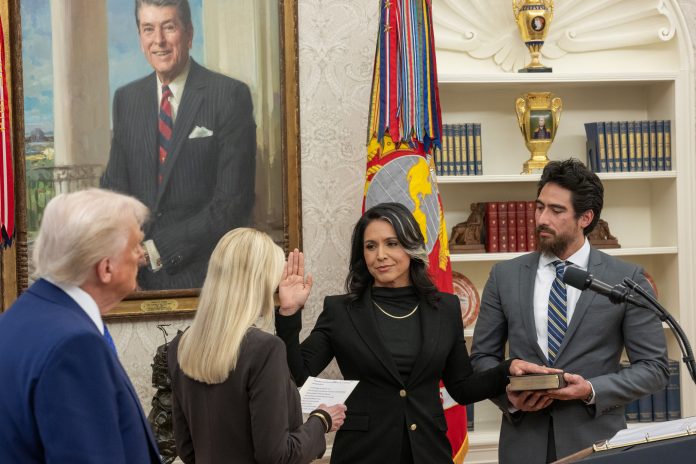Over the past few months, Tulsi Gabbard has undergone one of the most polarizing and rapid ascents in recent U.S. political memory—confirmed as Director of National Intelligence (DNI) under a returning Trump administration, triggering a media firestorm, bipartisan backlash, and a string of controversies that refuse to let up.
Gabbard’s confirmation, finalized in mid-February 2025, was a lightning rod for criticism. A former Democratic congresswoman turned independent firebrand, Gabbard was scrutinized during Senate hearings for her past praise of Bashar al-Assad, her ambiguous stance on Edward Snowden, and her perceived coziness with Russia. Despite opposition from Democrats and a few skeptical Republicans, Gabbard was pushed through with Trump-aligned backing, aided by GOP figures like Susan Collins and intense lobbying from Trump allies.
Since taking office, Gabbard has wasted no time reshaping the intelligence community in her image. She quickly made headlines by revoking the security clearances of dozens of former officials, including critics like Antony Blinken and Alvin Bragg. In a particularly explosive move, she announced the dismissal of over 100 intelligence officers due to “egregious violations of trust” involving sexually explicit chatroom activity on NSA platforms. These firings drew both praise from hardliners and alarm from civil liberties watchdogs.
Her tenure has been characterized by a heavy-handed crackdown on what she calls “deep state rot.” Gabbard launched a task force targeting internal abuses at U.S. spy agencies, advocated for the declassification of surveillance programs, and publicly lambasted CNN as a “propaganda arm of the CIA.” At the same time, she has been accused of politicizing her role—yanking clearances from high-profile Democrats, shielding Trump loyalists, and downplaying international concerns like climate change in intelligence briefings.
Internationally, her remarks have sparked diplomatic friction. Her criticism of religious violence in Bangladesh and comments on Sikh separatist movements have drawn rebukes from both South Asia and civil society groups. And in a speech that raised more than a few eyebrows, Gabbard described Trump as the “Peace President” despite his administration’s aggressive drone strikes.
Meanwhile, her public messaging leans heavily on themes of anti-establishment reform, national sovereignty, and surveillance transparency—but critics accuse her of flip-flopping on issues like FISA Section 702 just to secure Senate confirmation. The contradictions have not gone unnoticed. Headlines point to her past positions on civil liberties, now at odds with her current hawkish policies.
Compounding her controversial tenure are security threats: Gabbard and her husband were recently targeted in a violent death threat case, which the DOJ is now prosecuting.
What’s unfolding is a political saga that reflects the deep fractures in Washington—between surveillance and privacy, loyalty and dissent, Trumpism and traditional intelligence norms. Whether Gabbard’s tenure will mark a lasting shift in how the intelligence community operates or serve as a cautionary tale remains to be seen. But one thing is clear: she has placed herself at the very heart of America’s surveillance state—and lit a fire under it.


